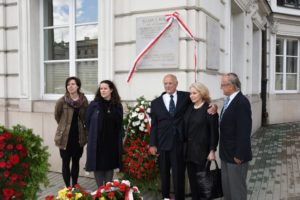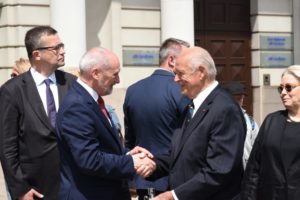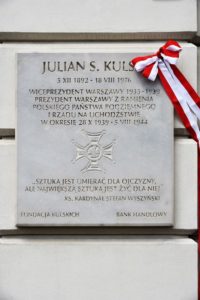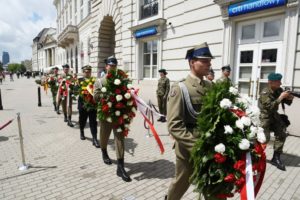Minister Antoni Macierewicz unveiled a commemorative plaque dedicated to Julian Spitosław Kulski, one of the greatest yet least known heroes of the occupied Warsaw.
Displayed on the front facade of the building at Senatorska Street, the plaque commemorates Julian Spitosław Kulski, Deputy Mayor of Warsaw in 1935-1939 and Mayor of Warsaw secretly cooperating with the Polish Underground State during the occupation. The plaque features a quote from Cardinal Stefan Wyszyński, “It is a great feat to die for the homeland but the greatest feat is to live for the homeland.”
The plaque fills a gap in history
According to Antoni Macierewicz, the plaque will be a testimony to all Poles to what the Nazi occupation looked like and what the people who defied it looked like.
This plaque borders a plaque dedicated to his closest friend and superior, Mayor Stefan Starzyński, the man who entrusted Kulski with this extraordinary mission to serve as mayor under the Nazi regime and, at the same time, a person who made it possible for the Warsaw underground structures to operate,” the Minister of Defence said at the ceremony.
In addition, Antoni Macierewicz promoted Julian Kulski, son of Julian S. Kulski, to the rank of Major in recognition of his service in Poland’s fight for independence.
“My father Julian Kulski has been my hero and moral compass for my whole life. I am immensely moved and honoured that today the Polish government and Warsaw City Hall decided to commemorate my father in such a monumental way,” Julian Kulski said.
The ceremony was also attended by Deputy MFA Jan Dziedziczak, Polish Ambassador to the US dr Piotr Wilczek and Head of the Ministry of Culture and National Heritage Department of Cultural Heritage dr Piotr Szpanowski.
The commemorative plaque was designed by the historian Kazimierz Sztarbałło.
* *
Julian Spitosław Kulski (5 December 1892, Warsaw, d. 18 August 1976, Warsaw) was a Polish politician and civic leader, soldier of Józef Piłsudski’s Polish Legions, combatant in the 1920 Polish-Soviet war, recipient of the War Order of Virtuti Militari, pre-war Deputy Mayor of Warsaw and a deputy and friend of Stefan Starzyński.
Following the surrender of Warsaw, he assumed the office of the Head of the Municipal Government (“commissioned mayor” according to the German nomenclature) of Warsaw on 28 October 1939, with the approval of the Polish underground government. He played a double role, officially as an administrator subject to the German occupier and secretly as a Polish “Mayor” of Warsaw.
On 4 August 1944, he resigned from the Municipal Government. After his resignation, he was accredited as a war correspondent at the Home Army High Command Bureau of Information and Propaganda, which allowed him to remain in Warsaw and freely move within the area held by members of the Polish resistance. On 27 August 1944, he was allowed to pass, using the city’s sewer system, to the district of Żoliborz. Once in Żoliborz, he reached his apartment at 23 Felińskiego Street, where he remained until the end of the Uprising.
During and after the war, he worked with the Polish government-in-exile in London, using municipal money to arm the Home Army and employing Home Army soldiers at the City Hall. He also provided numerous people with official documents, helping them legalise their stay in Warsaw. He hid two Jewish families from the Nazis in his house in the outskirts of Warsaw.
FOT. Marek Graniczkowski



